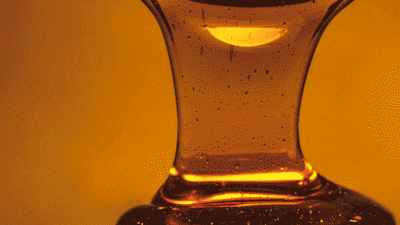Honey, both the word and the substance, are ever present in Arab culture. The word, much like in English, can be used to call on a loved one and be flirtatious with them. It’s also a word that is mentioned in the Quran twice, once highlighting its healing powers.
Honey, the substance, is also an essential part of Arab culture and cuisine – and was even taken to space by Emirati astronaut Sultan Al Neyadi.
The word aasal denotes sweetness as well as the product of a bee, so anything that is sweet could be described as tasting aasal.
The two mentions of honey in the Quran include it being described as the product of bees that could be used for healing purposes, and another time as a liquid found in heaven. The verse that first mentions honey in the Quran reads: “And the Lord inspired the bee, saying: 'Take your habitations in the mountains and in the trees and in what they erect. Then, eat of all fruits and follow the ways of your Lord made easy (for you)'. There comes forth from their bellies a drink of varying colours wherein is healing for men. Verily in this is indeed a sign for people who think”.
While not mentioning the word aasal, it describes a fluid that comes from bees that God instructs his followers to consume.
The second mention of honey in the Quran reads: “The description of Paradise which the pious have been promised is that in it are rivers of water the taste and smell of which are not changed; rivers of milk of which the taste never changes; rivers of wine delicious to those who drink; and rivers of clarified honey, clear and pure …”
The second mention uses the word aasal as a fluid that will be found in heaven and consumed by those who make it there. It holds up honey alongside milk and wine as liquids that those who make to heaven are rewarded by.
Honey, therefore, is always present in Arab households, often found on the kitchen table and used to compliment breakfast spreads or sweeten teas. In the UAE, the annual Hatta Honey Festival is held in December and attracts honey lovers and beekeepers from around the region to buy and sell their coveted products.
During the latest festival in 2023, Reda Wafi, owner of Sharjah-based AlReda Bee and Honey, told The National how seasonal changes, such as prolonged summer months, pose a significant threat to local honey production. “It is getting too hot for bees,” he said. “And when there are not enough trees for them to pollinate, we don’t get enough honey.”
Last year, during his time on the International Space Station, Emirati astronaut Al Neyadi posted a clip of himself enjoying honey and bread. “Have you ever wondered how honey forms in space?” he wrote in the caption of the video, which showed him squeezing a bottle of honey beneath a floating slice of bread.
“I still have some Emirati honey left that I enjoy from time to time. Honey has many benefits, especially for the health of astronauts,” he added.


















